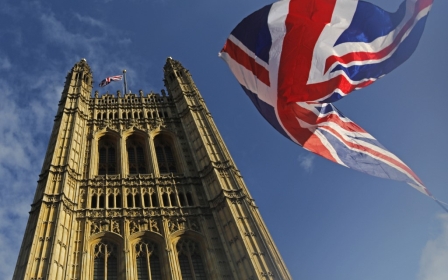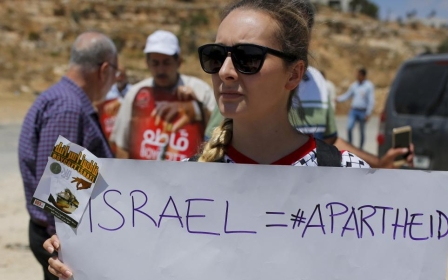Big Thief cancels Tel Aviv concerts after backlash from fans

American indie rock band Big Thief on Thursday cancelled two upcoming shows in Israel following a backlash from fans, citing their objection to the Israeli occupation of Palestine.
The group had announced last week that it would perform two shows in Tel Aviv on 6 and 7 July, which had originally been scheduled for 2020.
But following several days of criticism online, it pulled the gigs and apologised for the “recklessness and naivete of our original statement”.
"To be clear, we oppose illegal occupation and systematic [oppression] of the Palestinian people. We believe in the total freedom and self-determination for all Palestinians," the statement read.
Stay informed with MEE's newsletters
Sign up to get the latest alerts, insights and analysis, starting with Turkey Unpacked
In a statement that was almost verbatim from their justification two years prior, Big Thief wrote last week that they were to play in Tel Aviv because it was bassist Max Oleartchik’s hometown.
“It is important for us to go where we have family to share space and play for them. It is foundational. It is in that spirit that we made our decision to play in Israel,” it wrote.
The group added that it was “aware of the cultural aspect of the BDS [boycott, divestment, sanctions] movement”, but it did not know “where we fit into the boycott” or where “the moral high ground lies”.
Big Thief concluded the statement by stating that the show’s profits would be donated to medical and humanitarian aid for Palestinian children, and joint efforts between Israelis and Palestinians working for “a better future”.
Several days of criticism online followed, with rock fans particularly disappointed at Big Thief’s elaborate attempts to explain their decision.
Big Thief previously played at Barby in Tel Aviv in November 2017 - the same venue they had been due to play at next month.
'Sorry to those we hurt'
In the statement announcing the cancellation, the band clarified that when it had previously claimed not to know “where the moral high ground lies”, that was in reference to playing in Israel during calls of a cultural boycott, and not in reference to Israeli occupation.
“We acknowledge that aspects of our previous post were written unclearly and in avoidance of the magnitude and importance of this conversation. We also recognise that there are limitations to our perspectives based on our various layers of privilege.
“Our intent in wanting to play the shows in Tel Aviv, where Max was born, raised, and currently lives, stemmed from a simple belief that music can heal. We now recognise that the shows we booked do not honour that sentiment.
"We are sorry to those we hurt with the recklessness and naivete of our original statement on playing in Israel and we hope those who were planning to attend understand our choice to cancel them."
It went on to say that withholding “cultural labour” could not be the only action to take, and they would learn about more actions to be taken.
The boycott was welcomed warmly by the Palestinian Campaign for the Academic and Cultural Boycott of Israel (PACBI).
“We salute Big Thief’s courage and their willingness to listen to the oppressed. We recognise, too, the clear position of a majority of the group’s fans of principled support for BDS,” it said in a statement.
PACBI condemned Barby, the Tel Aviv venue, after it hit out at the band’s decision in an expletive-filled statement on Thursday.
The venue called Big Thief “a bunch of miserable spineless musicians who are afraid of their own shadow” and said it “wish[ed] you all the evil in the world just as you did to your fans in Israel”.
Middle East Eye delivers independent and unrivalled coverage and analysis of the Middle East, North Africa and beyond. To learn more about republishing this content and the associated fees, please fill out this form. More about MEE can be found here.




